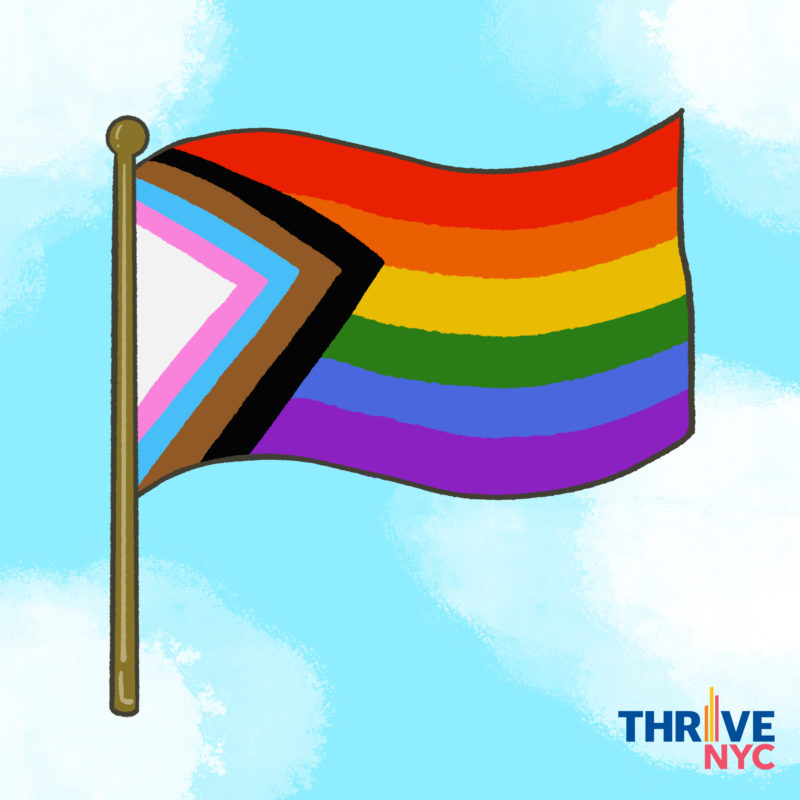How an LGBTQ New Yorker discovered the power of therapy
 Frank moved from El Paso, Texas to New York as a young, gay man. After many years working in the creative field, and experiencing loss and grief during the HIV/AIDS pandemic, Frank retired and discovered what he calls the “power of therapy.” Now, Frank offers support to young New Yorkers recently diagnosed with HIV. Below is Frank’s story as told to ThriveNYC:
Frank moved from El Paso, Texas to New York as a young, gay man. After many years working in the creative field, and experiencing loss and grief during the HIV/AIDS pandemic, Frank retired and discovered what he calls the “power of therapy.” Now, Frank offers support to young New Yorkers recently diagnosed with HIV. Below is Frank’s story as told to ThriveNYC:
When I was 19, a doctor told me that I’d die by 25 years old. I didn’t have family support. My mother died when I was 13 and my father died when I was 22.
After that, I shut down emotionally. Friends started dying, a lover of mine died, and for 25 years I shut myself down. I concentrated on my job and I didn’t think about HIV. I thought, if I don’t talk about it, it will go away. I didn’t want to deal with it.
But I had a good job, and I had a gay supervisor. My supervisor was out and was very proud. He was very supportive of me being gay. He encouraged me to be proud of the work we were doing. When my lover died in 1993 and I went to work the following day, my supervisor noticed something was wrong. He told me, “I don’t want you to come back for two weeks.” He came to my apartment and took care of everything. He was so loving and respectful. Everyone in the office was so supportive.
I had worked in theatre and in television for over 20 years when, in 2007, I ended up in a hospital with full blown AIDS. I had pneumonia and I couldn’t see. The next year, I decided to retire. But after I retired, I lost hope. My job was my identity, and without it, I didn’t know who I was. Was I a gay man? An HIV positive man? A Mexican man? A writer? What was I here for? I lost a lot of hope.
When I stopped working, I joined an HIV support group, and now I realize that was the foundation for me to get mental healthcare five years later. It took me a while, though. I didn’t want therapy. I didn’t believe in it. To me, it was a white person’s thing. I don’t push anyone into therapy, but I do share my experience with them – and tell them how powerful talk therapy has been for me.
Three years ago, I had a panic attack. My heart was beating so hard that I thought I was having a heart attack. My whole body was shaking, and I couldn’t understand what was happening to me. But then it went away.
I called my HIV doctor, and all the tests he did came out okay. He referred me to a psychiatrist. Eventually through GRIOT Circle, I found James, a social worker and therapist, and we have been doing talk therapy for two and a half years.
It helped a lot. I haven’t had a panic attack in over a year, and I know what to do if I’m having one. I stay calm and breathe, and I focus my brain on something else.
I didn’t know who else to talk to until I found James.
Talk therapy has been really helpful. Three years ago, my life was not sustainable. Thank God I found therapy, and I found a sense of hope.
Life is worth living, and I chose to live, in spite of HIV and in spite of losing loved ones. Sometimes I tell young people who are recently diagnosed that it’s not the end of their lives, especially now with treatment. You can live a great life, a good life. It’s up and down, but choose life.
We have to share, even as seniors. Our lives are not over until they’re over. But you have to choose to live. It’s a conscious decision. A lot of seniors lose hope because we lose our friends, jobs, and identities. Don’t give up. Don’t close yourself off. Talk to someone. Find a support group.
Recently, I started writing in a little journal, taking notes. It’s not like the writing I used to do professionally, but it makes me feel hopeful. Maybe I will go back to my writing again. I’m learning how to accept compliments now, and how to say I’m happy. I’m hopeful.